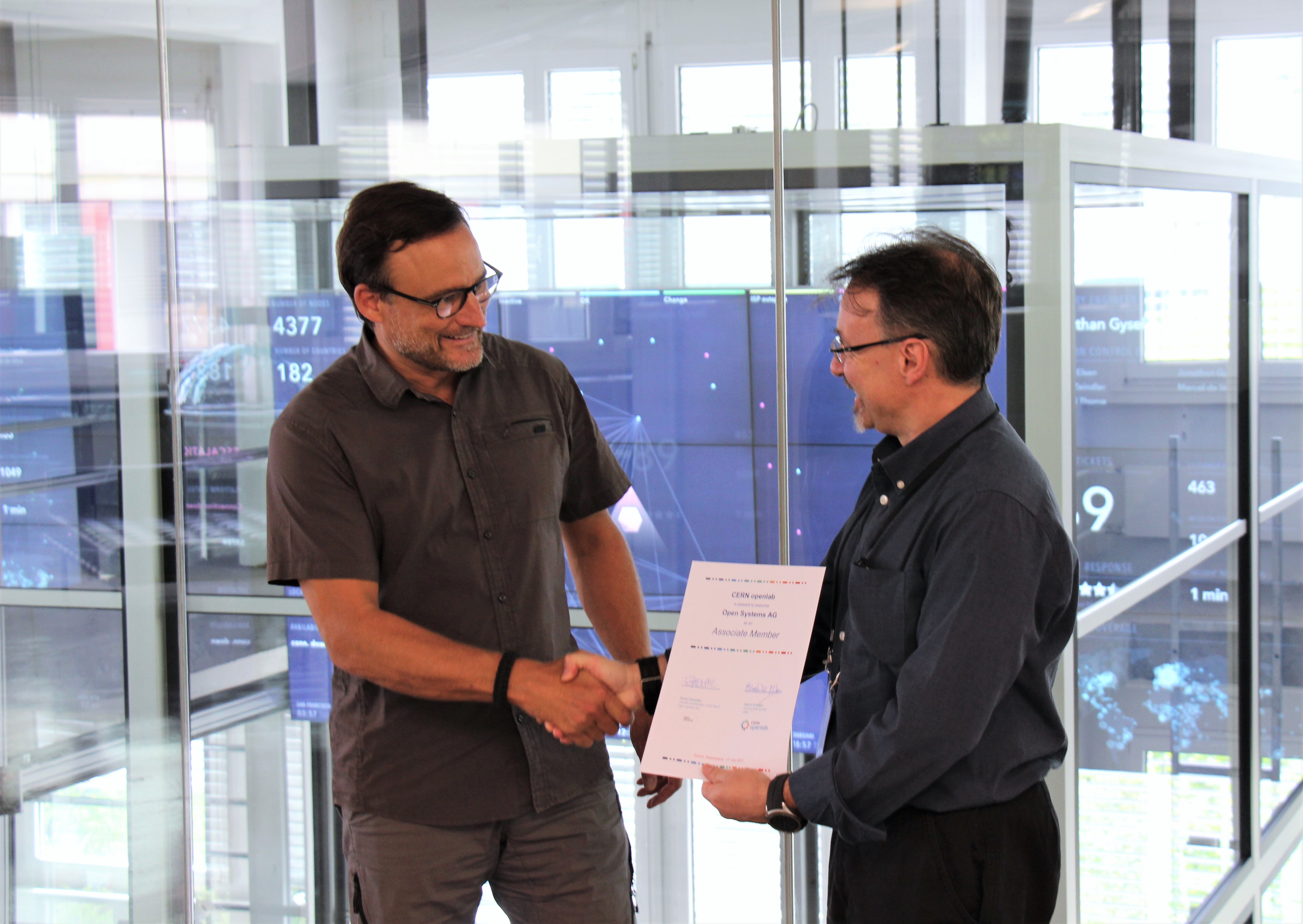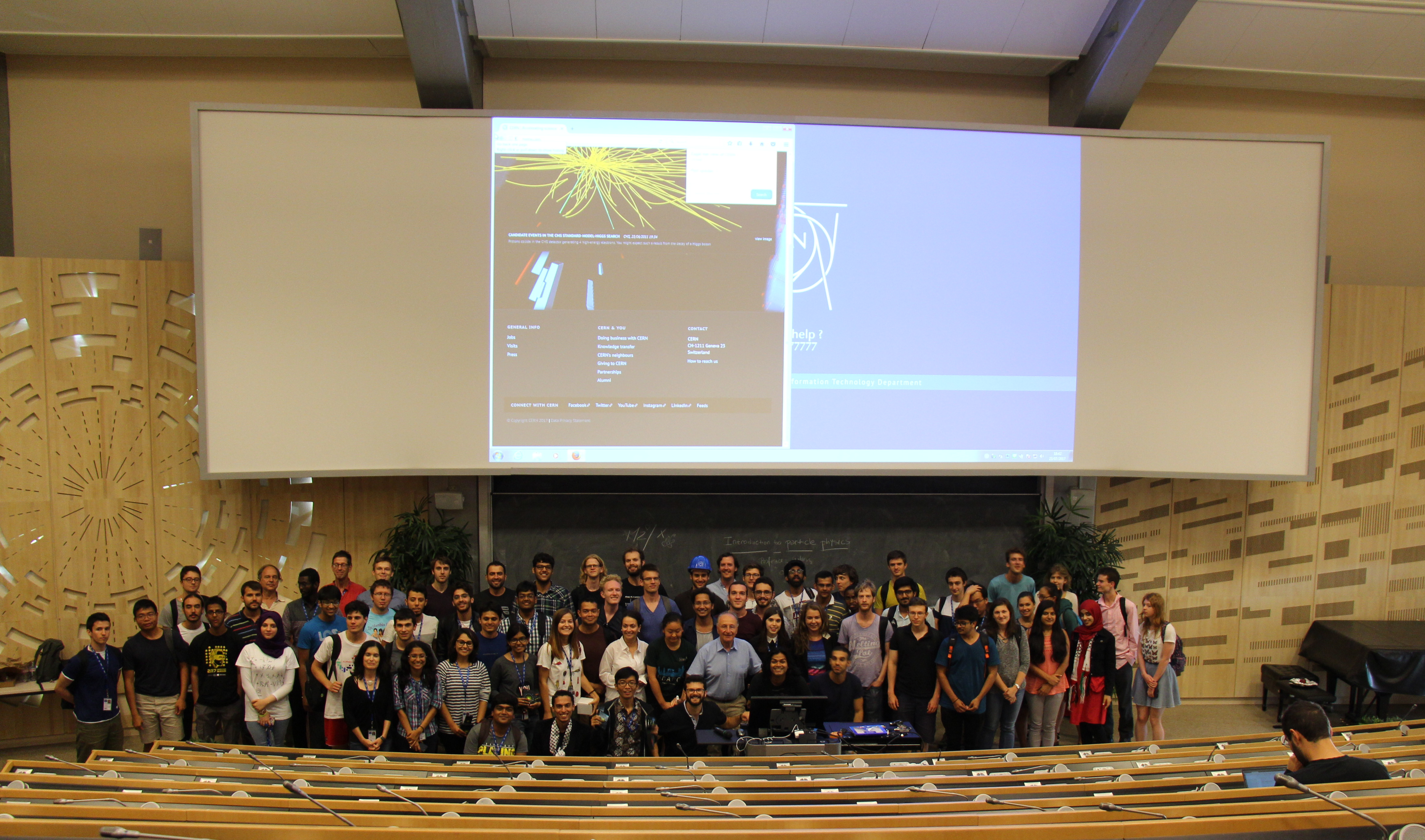
2017 CERN openlab Summer Student Programme comes to a close
The final students participating in the 2017 CERN openlab Summer Student Programme recently left CERN. 37 students — representing 22 different nationalities — took part in this year’s programme. They each spent nine weeks at CERN, working on advanced computing projects with applications in high-energy physics and beyond.
As part of the CERN openlab Summer Student Programme, the students attended a series of lectures given by IT experts on advanced CERN-related topics and had the opportunity to visit the CERN facilities and experiments, as well as other organisations.
Educational excursions
This year, the students went on a two-day trip to Zurich, where they visited Google, ETH Zurich, and Open Systems. As with the previous six years, this trip was organised by the team at Open Systems, who have been awarded the status of ‘CERN openlab associate member’. “We are very pleased to welcome Open Systems to our collaboration in recognition of their fantastic support for our educational activities,” says Alberto Di Meglio, head of CERN openlab.
"It is a great honour for Open Systems to be part of the CERN openlab family,” says Florian Gutzwiller, the company’s founder. “Hosting the summer students at our Zurich headquarters has become a  genuine highlight for everybody at Open Systems. The diversity and talent that the CERN openlab Summer Student Programme attracts from all over the world never ceases to amaze.”
genuine highlight for everybody at Open Systems. The diversity and talent that the CERN openlab Summer Student Programme attracts from all over the world never ceases to amaze.”
Two of the summer students also took a two-week trip to China, where they continued their project work in Beijing and Shenzhen, collaborating with Tsinghua University. These students, whose projects focused on citizen science and crowd computing, were both working with the SDG (Sustainable Development Goals) Summer School at the University of Geneva. Discussions are currently ongoing with representatives of this university about joining CERN openlab.
Webfest creativity
Another highlight of the summer was the CERN Summer Student Webfest. The event is a hackathon, through which bright and creative minds meet over a weekend to build cool science projects using open
web technologies. This year’s Webfest, which was supported by CERN openlab, featured over 70 participants collaborating on 14 projects over a weekend.
A diverse range of ideas were developed over the weekend, including augmented-reality apps, educational games, expert chat bots, puzzles, and more. Tony Al Najjar, a summer student working with the CMS experiment, was selected as the winner of the competition by a panel of judges. He created an interactive and educational LED-based game called CERcle, which puts players in control of the LHC.
“I truly enjoyed the competitive, yet cooperative atmosphere. I was absolutely amazed by quite a lot of the ideas presented and the amount of work completed in just two days,” says Al Najjar. “The dedication was there, the creativity was there, and — most importantly — the fun was there; that's recipe for innovation.” Al Najjar has won a trip to London to participate in the Mozilla Festival at the end of October.
Projects presented
While the students had lots of fun — and learnt much — during the trips, the webfest, and the lecture series, the main focus of their time at CERN was undoubtedly their projects. These covered a diverse range of topics, including high-performance computing, big data, visualisation, machine learning, and much more. The projects enabled the students to gain hands-on experience with some of the latest ICT solutions, working under the supervision of leading experts in the field.
On 11 and 15 August, the students presented their work in two dedicated public ‘lighting talk’ sessions. In 5-minute presentations, each student explained the technical challenges they have faced and described the results of what they have been working on for the nine weeks they have spent at CERN.
The best presentations from each of the two sessions were selected by a panel of judges. The winners from the first session were as follows:
 1st: Sharad Agarwal, IoT Security
1st: Sharad Agarwal, IoT Security
2nd: Agrima Seth, Anomaly Detection using Machine Learning for Data Quality Monitoring in the CMS Experiment
3rd: Alastair Cuthbert Paragas, Zenodo Keyword Auto-Suggest using Parallel Graph Analytics
The winners from the second session were as follows:
1st: Markus Sommer, Stateful Services in Containers
2nd: Yasmine Nasri, Building Effective Database Backup and Recovery Monitoring Using Elastic Stack
3rd: Clenimar Filemon Souza, Kubernetes as a batch scheduler
“I feel incredibly thankful to have had this opportunity, to get to know and work with such incredible minds” says Sommer, a student from Philipps University in Marburg, Germany, who was selected as this year’s overall winner.
“The presentations opened my eyes to the importance of exploring every moment spent at CERN,” says Khaled Abushammala, from the Islamic University of Gaza in Palestine. “I was able to learn a lot, which impacted my skills, personality, and much more.” Abushammala’s participation in the programme was supported by UNRWA and GGateway, in line with the international cooperation agreement signed between CERN and Palestine in December 2016.
Student challenge
Five of this year’s summer students have also been selected to take part in the Intel® Modern Code Developer Challenge with Intel. This competition sees the students’ blog about their projects — all of which either make use of Intel projects or are connected to broader collaborative initiatives between Intel and CERN openlab — on a dedicated website. This website also features audio interviews and videos with the students discussing their projects.
One of the five students will be selected as the winner (the one whose project work over the summer is deemed the most successful by a panel of judges) and will be invited to present their work at two major events in November: the Intel® HPC Developers Conference and the SC17 conference.
An overview of the five projects can be found below:
Smash-simulation software
Teaching algorithms to be faster at simulating particle-collision events.
Elena Orlova
Connecting the dots
Using machine learning to better identify the particles produced by collision events.
Antonio Carta
Cells in the cloud
Running biological simulations more efficiently with cloud computing.
Konstantinos Kanellis
Disaster relief
Helping computers to get better at recognizing objects in satellite maps created by a UN agency.
Muhammad Abu Bakr
IoT at the LHC
Integrating Internet of Things devices into the control systems for the Large Hadron Collider.
Lamija Tupo
“We are thrilled to support these students through the Modern Code Developer Challenge. Intel's partnership with CERN openlab is part of our continued commitment to education and building the next generation of scientific coders that are using HPC, AI & IOT technologies to have a positive impact on people’s lives across the world ,” says Michelle Chuaprasert, Director, Developer Relations Division at Intel.
“Training the next generation of developers — the people who can produce the scientific code that makes world-leading research possible — is of paramount importance across all scientific fields,” says Di Meglio. “We’re pleased to partner with Intel on this important cause.”
.jpg)
Join us next year
The 2017 CERN openlab Summer Student Programme was a great success,” says Maria Girone, CTO of CERN openlab. “We received enthusiastic feedback from the students on the programme; we were also very pleased to see their high level of engagement and commitment throughout the summer.”
Students wishing to participate in the 2018 CERN openlab Summer Student Programme should check the CERN openlab website again when applications open in December. In the meantime, more information about the programme can be found here: http://cern.ch/go/9PnX.










.jpg%3Fitok=givJYobq)
